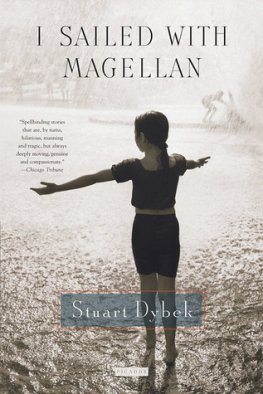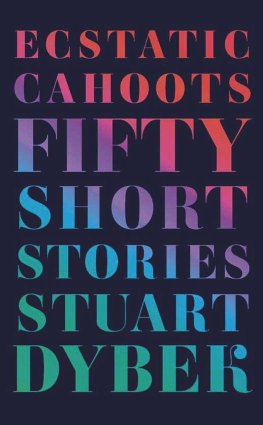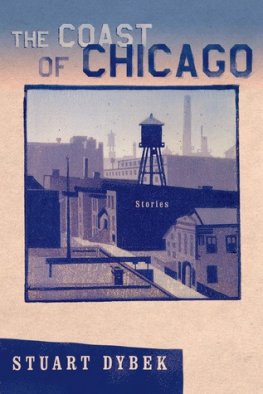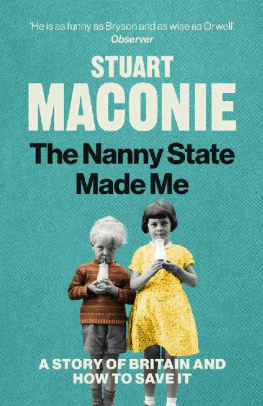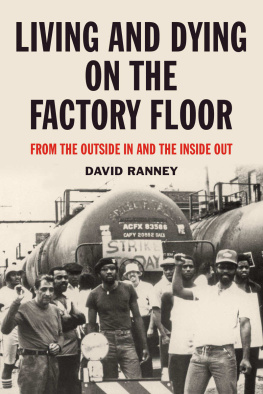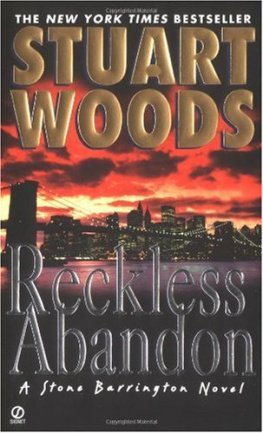Stuart Dybek - I Sailed with Magellan
Here you can read online Stuart Dybek - I Sailed with Magellan full text of the book (entire story) in english for free. Download pdf and epub, get meaning, cover and reviews about this ebook. year: 2004, publisher: Farrar, Straus and Giroux, genre: Prose. Description of the work, (preface) as well as reviews are available. Best literature library LitArk.com created for fans of good reading and offers a wide selection of genres:
Romance novel
Science fiction
Adventure
Detective
Science
History
Home and family
Prose
Art
Politics
Computer
Non-fiction
Religion
Business
Children
Humor
Choose a favorite category and find really read worthwhile books. Enjoy immersion in the world of imagination, feel the emotions of the characters or learn something new for yourself, make an fascinating discovery.
- Book:I Sailed with Magellan
- Author:
- Publisher:Farrar, Straus and Giroux
- Genre:
- Year:2004
- Rating:3 / 5
- Favourites:Add to favourites
- Your mark:
- 60
- 1
- 2
- 3
- 4
- 5
I Sailed with Magellan: summary, description and annotation
We offer to read an annotation, description, summary or preface (depends on what the author of the book "I Sailed with Magellan" wrote himself). If you haven't found the necessary information about the book — write in the comments, we will try to find it.
I Sailed with Magellan — read online for free the complete book (whole text) full work
Below is the text of the book, divided by pages. System saving the place of the last page read, allows you to conveniently read the book "I Sailed with Magellan" online for free, without having to search again every time where you left off. Put a bookmark, and you can go to the page where you finished reading at any time.
Font size:
Interval:
Bookmark:
Stuart Dybek
I Sailed with Magellan
For Adeline Dybek
19132003
In memory everything seems to happen to music.
Tennessee Williams, The Glass MenagerieYo no digo esta cancin
sino a quien conmigo va.
I shall never teach you this song
unless you sail away with me.
Anonymous, El Conde ArnaldosSong
Once I was a great singer. Caruso Junior they called me, and Little der Bingle. Crooners like Bing Crosby and Sinatra were still big in those days. My repertoire included Clang, Clang, Clang Went the Trolley, the song behind my ambition to become a streetcar conductor. I knew the nameless tune my mother sang when we waited for the El: Down by the station early in the morning, see the little puffer-billies all in a row; and my uncle Lefty had taught me a version of Popeye the Sailor Man that went, Im Popeye the Sailor Man, I live in a garbage can, I eat all the junk and smell like a skunk, Im Popeye the Sailor Man, I am.
But none of those was the song for which I was famous, the song requested over and over. Theyd hoist me onto the bar, where Id carefully plant my feet among the beer bottles, steins, and shot glasses, and, taking a breath of whiskey air, belt out Old Man River. Id learned the song by listening to my fathers mournful baritone while he shaved for work. It wasnt a popular song of the time, not one youd find on the mob-owned jukeboxes in those taverns where Thats Amore or the Too Fat Polka were as likely to be thumping from the speakers as Hound Dog. But the men drinking there had all toted that barge and lifted that bale and got a little drunk and landed in jail, too, and had the scars to prove it. The noisy bar would quiet, small talk deferring to lyrics.
Hes sure got a deep voice for his age, someone would invariably comment.
When I finished the song, holding the last note as if I dove down to the dark river bottom for it, they cheered and showered me with loose change and sometimes a few dollar bills.
Whats the little man drinking? they asked Uncle Lefty.
Whatll it be, champ? Lefty would relay to me.
Root beer, Id shout, and root beer it was.
Id sit with my feet dangling over the bar, slugging from a heavy stein. Singing gave one a thirst. Then Uncle Lefty, whod also had a few on the house, would comb his nicotine-stained fingers through my hair, straighten my buttons as if tuning me up, and lift me from the bar, gently, like a musical instrument he was packing away, an instrument that he carried with him one that sometimes rode his shoulders as he made the rounds from tavern to tavern.
Wed go from Deuces Wild on Twenty-second to the Pulaski Club across from St. Kasmir, and from there wed hit the Zip Inn, where Zip, whod lost his right arm in the Big War, tended bar. Zip always kept the empty sleeve of his white shirt neatly folded and clamped with a plastic clothespin red, blue, yellow, green he changed the colors the way some guys changed their ties. The walls of his bar were hung with framed photographs of the softball teams hed sponsored, and there was also a photo of a young Uncle Lefty with his boxing gloves cocked, taken when he fought in the Golden Gloves tournament.
Ah, my fellow Left-wingers, Zip would greet us.
Quit trying to pass yourself off as a genuine southpaw, Lefty would tell him. You aint fooling nobody.
I admit it. Im a convert, but hey, converts are the true believers. Fact is, my right arm is killing me today. Means rain.
Zip, its pouring already, Lefty said, peeling a hard-boiled egg hed helped himself to from the bowl on the bar. Think wed stop in a dive like this if we werent getting soaked?
Both Zip and I glanced out the door propped open with the doorstop of a brass spittoon. Sunbeams fuming with blue tobacco smoke streamed into the dim tavern. Zip looked at me and shrugged.
Uncle Lefty snatched the checked bar rag from Zips left shoulder and toweled off my hair as if I was dripping wet. Phantom pain brings phantom rain, he said by way of explanation.
Perry, Zip said, your uncle is a very strange man.
Zip, Lefty asked, did I ever mention this kid can sing?
And later, my pockets jangling with tips, wed open invisible umbrellas and step from Zips into the phantom rain, on our way to Reds on Damen, or to the frigid, mint blue bar at Cermak Bowl, where, I believed, air-conditioning was invented, or to Juanitas, a bar that also served tacos, or to the VFW, which had slot machines. There were more taverns in the neighborhood than we could visit in a single afternoon. At every stop it was the same: Old Man River, applause, bar change, and root beer, until Uncle Lefty, who was downing two boilermakers to every drink of mine, would caution, Youre gonna have a head of foam when you pee. Dont tell your mother how many youve had or well both be in Dutch with her.
My mother was Leftys older sister. It was from her that Id heard how Lefty had wanted to be a musician ever since he was a kid. As a child, Lefty had chronic bronchitis, and my mother remembered him spending his sick days home from school devising instruments from vacuum-cleaner attachments. Hed give the family a concert at night, humming through his homemade horns while moving his fingers as if tootling up and down the scale. My mother said that Lefty could perfectly imitate the sound of any wind instrument so long as he had a vacuum-cleaner nozzle or a cardboard tube that he could pretend to blow.
When he was thirteen, Lefty saved enough money from his paper route to buy a trumpet, but a week after buying it, he had a front tooth broken in a school-yard fight, which ruined his embouchure. So he traded in the trumpet for a tenor saxophone, and took the precaution of signing up for boxing lessons at St. Vitus, where Father Herm, a priest who was an ex-heavyweight, trained boys to fight in Catholic Youth Organization bouts. For months, Lefty monopolized the full-length mirror on my mothers bedroom door, shadowboxing himself into a sweat. The opponent in the mirror was Bobby Vachata, the kid whod broken Leftys tooth, though no one suspected Leftys boxing obsession was fueled by revenge until he gave Vachata a beating and brought a furious Father Herm to the house. Lefty was expelled from the St. Vitus CYO, and for the next year the proceeds from his paper route went to pay Vachatas dental bills.
When he wasnt shadowboxing, Lefty was in the basement practicing his sax. Thats what he called it, my mother said, though he wasnt actually playing the horn any more than hed played the vacuum-cleaner attachments. The family could hear the sound rising through the heating ducts as he slurred and honked and wailed a mimicry so convincing that, if you didnt know, youd think there was a virtuoso down there, who could play any song at will. But my mother knew his fingers were still moving along imaginary scales, and his pretend playing no longer seemed cute to her as it had back when Lefty would give them concerts after dinner. Something about all that music at once unexpressed and yet erupting from her younger brother, all that sound swirling nonstop in his head, made her afraid for him. Then, one evening, she heard Lefty suddenly stop improvising on How High the Moon. There was silence followed by a metallic squawk and then another squawk and another, notes croaked haltingly, the way lyrics might be sounded out by a deaf person learning to sing: some where theres mu sic how high the moon? She realized that Lefty had finally fit a reed into the mouthpiece and was teaching himself to play.
By high school Lefty had grown into a welterweight and was training for the Golden Gloves at Gonzos Gym on Kedzie, where the mostly lighter-division Mexican fighters boxed. Hed taught himself to play the sax almost as proficiently as hed once faked playing it. With a few buddies from Farragut High, he started the Bluebirds, which Lefty described as a bebop polka band. They played taverns for parties and weddings with Lefty on sax and vocals. It was difficult to imagine him singing because of the raspy whisper he spoke in, but my mother said when he was young, Lefty could croon like Mel Torm, a singer known as the Velvet Fog. Lefty had returned from a Korean POW camp and a subsequent yearlong detour at a VFW mental hospital in California with a chronically hoarse, worn-away voice. It was a voice a rock singer might have envied, but rock and roll wasnt the music Lefty grew up playing. When he shipped out for Korea, the music from World War II had still hung in the air. His war didnt have its own music, and years later, when he stepped back into America, the countrys allegiance had shifted to another beat. The raspy voice was the only voice of his I heard live, but I once listened to a scratchy 45 rpm record hed sent to my mother from San Diego while on leave before his troopship sailed for Japan. Lefty crooned an a cappella Ill Be Seeing You, and even on that disk of flimsy acetate, when he hit the words Ill be looking at the moon, but Ill be seeing you, I could hear the velvet foggy vibrato of his voice and turned to say so to my mother, but shed left the room. It was the last I ever saw of that record.
Font size:
Interval:
Bookmark:
Similar books «I Sailed with Magellan»
Look at similar books to I Sailed with Magellan. We have selected literature similar in name and meaning in the hope of providing readers with more options to find new, interesting, not yet read works.
Discussion, reviews of the book I Sailed with Magellan and just readers' own opinions. Leave your comments, write what you think about the work, its meaning or the main characters. Specify what exactly you liked and what you didn't like, and why you think so.

